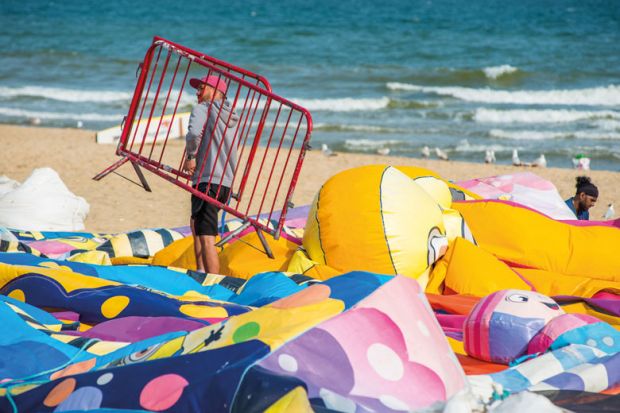Members of the UK’s biggest higher education pension scheme are pushing for a commitment to restore the losses they have suffered and say the “huge turnaround” in its finances should not prevent difficult decisions being made about how it is run.
Benefits akin to those that existed before the April 2022 cuts to the Universities Superannuation Scheme (USS) look set to be restored but only if a lengthy valuation process confirms that a £14 billion deficit has become a £5 billion surplus in just three years.
USS indicated that the earliest any changes could come was April 2024, leaving a two-year period in which members and employers are paying to cover the costs of a deficit that seemingly no longer exists.
Neil Davies, who brought a legal case against USS directors over the cuts, said if you took the scheme’s own estimates that the changes would save £1.5 billion over two years, this would mean an average loss of £7,000 for each of its 212,000 active members.
The professor of medical statistics at UCL said a commitment to restoring these losses would go some way to repairing the “bad blood” members felt towards those running the scheme, adding this was something his own legal action – waiting to be heard in the Court of Appeal – “will be looking into as a possible outcome”.
Jo Grady, general secretary of the University and College Union (UCU), has hailed the “steps in the right direction for resolving this long and bitter dispute” but said the “process is, of course, not as fast as we all would like, which is why it is vital we secure commitments today from employers for full restoration”.
While some strikes planned by the union were cancelled after the breakthrough on pensions, the UCU has re-balloted members, which could extend the threat of industrial action for another six months. Negotiations in the separate dispute over pay and working conditions are continuing.
Paul Hamilton, head of higher education at the consultancy Barnett Waddingham, said changes in interest rates and future inflation expectations had helped rescue the USS but cautioned that market conditions may vary while the full valuation is carried out.
“It will be some time before we know the outcome, and what that might mean for benefit changes,” he said.
Mr Hamilton said the “huge” £20 billion upswing in the USS’ funding position highlighted the volatility of the scheme and while “it has gone in the right direction this time, it could just as easily go the other way”.
“My worry is that this good news allows the parties involved to delay taking the decisions needed…that would reduce this volatility,” Mr Hamilton said. “It would be much better to try to get it right now than try to do it in a more challenging environment.”
Professor Davies agreed that “pretty serious” reform of the scheme was needed and said he would like to see members given more say over the valuation process and elect directors to hold them more accountable.
Dr Grady said there needed to be a “root-and-branch review” of the valuation methodology and how the USS “responds to these discussions on methodology, volatility and excessive pessimism for future valuations will be critically important to the sector”.
“I can imagine and hope for a future where we are not locked into a cycle of industrial action over the USS pension scheme, but what remains immediately clear is that the threat of more action and an extended mandate is needed to secure what are currently just commitments,” Dr Grady added.
Register to continue
Why register?
- Registration is free and only takes a moment
- Once registered, you can read 3 articles a month
- Sign up for our newsletter
Subscribe
Or subscribe for unlimited access to:
- Unlimited access to news, views, insights & reviews
- Digital editions
- Digital access to THE’s university and college rankings analysis
Already registered or a current subscriber? Login








